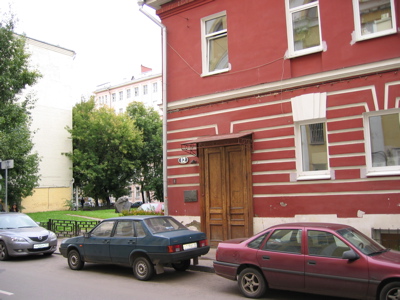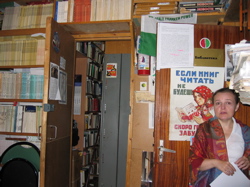Memorial

Memorial's Moscow Office.
The woman at Vichy's Bureau de Tourisme reddened, reluctantly reaching under the counter for a one-page, xeroxed historical map that showed where the Second World War government offices, such as the Commisariat for Jewish Matters, used to be. (See French Wikipedia article.) Today, Vichy's citizens prefer to discuss their wonderful spas and waters.
In Edenton, North Carolina the gracious woman at the Chamber of Commerce frowned when I asked for information about Harriet Jacobs, the celebrated run-away slave girl. (See Wikipedia article.) Today, Edenton's boosters prefer to recall their rich colonial history and showcase their beautifully restored old houses. Some of them even insist that Harriet Jacobs was fictional.
Lynchings in the United States occurred with disturbing frequency many years after Americans should have absorbed the new principles of freedom and self-government expressed in the U.S. Constitution. These lynchings sought to terrorize African-Americans into submission and deny them civil rights. Few historical plaques mark these lynchings to remind us that the victims died because their government failed to protect them.
Nations prefer to remember times of glory. They want to celebrate historical moments that can be sung in sagas, create good feelings and inspire happy celebrations. Remembering moments of human weakness and failure, trying to learn from our mistakes, is painful.
Just prior to the collapse of the Soviet Union, Russians began to face painful memories, especially those of labor camps and firing squads. The government decreed October 31st to be a special memorial day for the victims of political oppression.
Memorial, according to its website , (some pages in English) is a "movement formed to preserve the memory of the recent political oppressions" and remains at the forefront of groups insisting that Russians continually confront their tragic past.
In describing its detailed historical research into the oppressions, Memorial declares:
".. leaving behind the tragic truth means abandoning one's own memory. A society without memory will obediently play into the hands of any demagogue; people in such a society are no better than nuts and bolts in the state machine. They are worthless slaves to an inhumane ideology that promises everyone happiness.
However horrible the past may have been, forgetting it would make the future even worse.
The basic goal of Memorial to look for the path to the past for the sake of the future."
That's a good message for non-Russians as well.
A database of addresses (in Russian) and biographical information of almost twelve thousand Muscovites who died by Stalin's firing squads is one of Memorial's most striking on-line exhibits. While the database still lacks thousands of Moscow victims' names due to information problems, the existing list is overpowering.
Stalin had sixty people shot who lived on my small Moscow side street, seventeen of them from the apartment building across the way. According to the database one of my neighbor's in 1938 would have been:
Shemyatovskiy, Vasiliy Vasiliyevich. Born 1901, Ryazan region, Mikhailovskiy area, Boyarintsevo. Russian, member of the Communist Party, Head of the Fuel Department of the State Planning Organization. Address: Sivtsev Vrazhek, house 15/25, apartment 118. Shot 8 April 1938. Buried at Kommunarka.

Memorial maintains a Moscow office with a library and an archive open to anyone interested in researching Stalinist oppression. Alexander Daniel, a Memorial director and son of Soviet dissident Yuriy, also oversees research on the Soviet dissident movement. According to several staff members, they still have good access to archival materials and continue their research.
These efforts should lead us to reflect. Human slavery, Nazi Germany's atrocities, lynchings, Pol Pot's Cambodian massacres, genocide in Rwanda, the rape of Nanking and Stalin's brutal regime are all tragic moments of human history. Memorial is about all of us, not just Russians.